Ecodesign of packaging
Implemented over a decade ago, our ecodesign packaging project seeks to optimise the packaging of our Private Brand and perishable products, maintaining product integrity and including the following objectives:
- reduce the amount of material used;
- promote circular packaging by incorporating recycled materials into its composition and increasing recyclability;
- rework the size, weight and shape of packaging, to enable more product quantities to be transported in each journey.
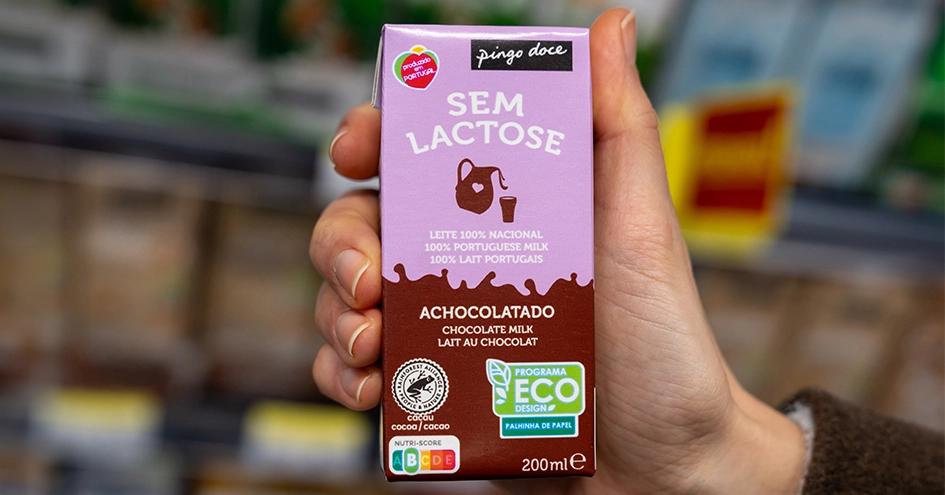
Since its launch in 2011, we have avoided the use of 50,351 tonnes of materials as a result of the more than 2,300 changes made, including around 1,000 FSC® or similar certified packages. We calculate that the ecodesign packaging project also helped avoid the emission of 6,882 tonnes of carbon equivalent, as a result of increased transport efficiency.
Closed Loop at Biedronka
The Closed Loop project involves the collection of used paper boxes from Biedronka stores, which are then recycled and transformed back into raw material for the manufacture of new cardboard boxes used to display Private Brand products in the Company’s stores. Launched in 2022, a dedicated symbol has been used to identify these recycled boxes since 2023. In 2024, we collected 8,322 tonnes of cardboard and transformed it into more than 31.6 million new boxes.
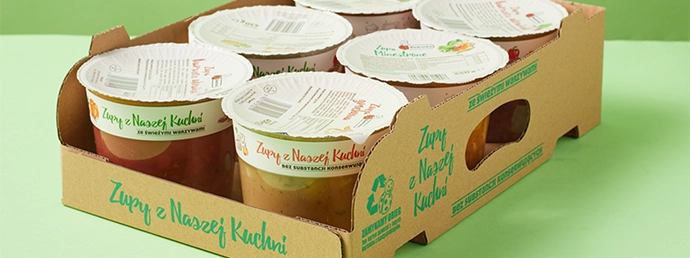
In 2024, we implemented 454 ecodesign packaging projects (262 at Biedronka, 85 at Hebe, 72 at Pingo Doce, 21 at Ara and 14 at Recheio), achieving 25.7% of Private Brand packaging changed since 2011.
As regards the reusability of plastic packaging, in 2024 we determined that 1.1% of this packaging was reusable (0.2 p.p. less than in 2023), according to the Ellen MacArthur Foundation’s proposed method for reporting this indicator to the Global Commitment.
Packaging ecodesign – highlights from 2024
Biedronka – Kraina Mięs pork vacuum packs now have an absorbent pad made entirely from FSC® certified cellulose, replacing the plastic pads and meeting the required expiry dates. These changes have helped avoid 55 tonnes of plastic per year.
Pingo Doce – the packaging of Mini Bolachas Salgadas 350 g, consisting of a jar and lid, now incorporates 30% recycled PET in the jar, avoiding 4 tonnes of virgin plastic per year.
Recheio – five Amanhecer products launched with FSC® certified cardboard packaging.
Ara – the size of the plastic labels on 13 fresh meat products was reduced, avoiding 2.7 tonnes of plastic per year.
Hebe – the paper used in the packaging of 85 Private Brand products is now FSC® certified.
Reusable packaging
The use of reusable packaging in our operations enables us to avoid disposable packaging. In 2024, reusable boxes for perishables avoided the use of over 42,000 tonnes of disposable packaging, 5% more than in 2023.
Pingo Doce and Recheio use a pool of boxes to pack and transport perishables between central kitchens, distribution centres and shops. This system has made it possible to reuse these boxes 44 million times. At Biedronka, this figure stood at 21.2 million uses for bakery products, while Ara recorded more than 19 million uses of reusable boxes to transport bottled water, milk, meat, and fruit and vegetables.
The ECO plastic bottle refilling station, available at Pingo Doce, is another example of our reusable packaging solutions. This solution has been extended to 310 stores, 26 more than in 2023, avoiding the consumption of 101 tonnes of single-use plastic in 2024, 3% less than the previous year, as a result of a decrease in the refilling of the largest volume formats (6 L and 3 L).
Reusable solutions for transporting customers’ shopping
Material used by type of solution |
|
2024 |
|
2023 |
|
Δ 2024/2023 |
||||
|---|---|---|---|---|---|---|---|---|---|---|
Reusable paper check-out bags (tonnes) |
|
1,439 |
|
1,024 |
|
+40.5% |
||||
Biedronka |
|
1,221 |
|
906 |
|
+34.8% |
||||
Hebe |
|
16 |
|
15 |
|
+6.7% |
||||
Pingo Doce |
|
95 |
|
101 |
|
-5.9% |
||||
Recheio |
|
0 |
|
0 |
|
– |
||||
Ara |
|
107 |
|
2 |
|
+5,250.0% |
||||
Single-use plastic check-out bags1 (tonnes) |
|
9,064 |
|
9,548 |
|
-5.1% |
||||
Biedronka |
|
6,468 |
|
7,069 |
|
-8.5% |
||||
Hebe |
|
43 |
|
44 |
|
-2.3% |
||||
Pingo Doce |
|
2,342 |
|
2,199 |
|
+6.5% |
||||
Recheio |
|
7 |
|
8 |
|
-12.5% |
||||
Ara |
|
204 |
|
228 |
|
-10.5% |
||||
Trolleys (units) |
|
30,736 |
|
32,955 |
|
-6.7% |
||||
Biedronka |
|
0 |
|
0 |
|
– |
||||
Hebe |
|
0 |
|
0 |
|
– |
||||
Pingo Doce |
|
30,722 |
|
32,950 |
|
-6.8% |
||||
Recheio |
|
14 |
|
2 |
|
+600.0% |
||||
Ara |
|
0 |
|
3 |
|
-100.0% |
||||
|
||||||||||
Consumption of paper bags increased significantly, particularly at Biedronka and Ara. In the case of Biedronka, consumers opted for paper bags given the reduced availability of plastic check-out bags. At Ara, the entry into force in July 2024 of legislation regulating the use of plastic bags in Colombia saw an increase in the paper alternative.
Our Companies stopped providing plastic check-out bags for free in 2017. In 2024, the purchase of reusable bags by our customers decreased 5.1%. These bags incorporate in quantity between 50% and 85% of post-consumer recycled plastic (corresponding to a total of around 7,400 tonnes in 2024). The reusable polyethylene plastic bags available at Biedronka and Pingo Doce are Blue Angel certified.
Paper bags at Biedronka and Pingo Doce contain a minimum of 70% recycled material (1,028 tonnes in 2024).
Promoting bulk sales
Besides selling fruit and vegetables by weight in most of our food distribution stores, we also offer this option in other categories.
Biedronka and Pingo Doce stores sell sweets and nuts in bulk. In 2024, Biedronka sold 33.4 tonnes of bulk products (a service available in all of its stores) and Pingo Doce sold 158 tonnes (available in 40% of its stores).
Ara offers the bulk sale of rice, sugar, beans and lentils in 300 stores (21% of the chain). In 2024, 5.3 tonnes of these products were sold, 61% less than in 2023, due to restrictions imposed by the Colombian authorities.
Fighting food waste
We are committed to limiting annual food waste to 2.5% of the total sales volume (tonnes) of foodstuffs in the period from 2024 to 2026. This target is an intermediate step towards our goal of contributing to target 12.3 of Goal 12 – Responsible Consumption and Production of the United Nations Sustainable Development Goals.
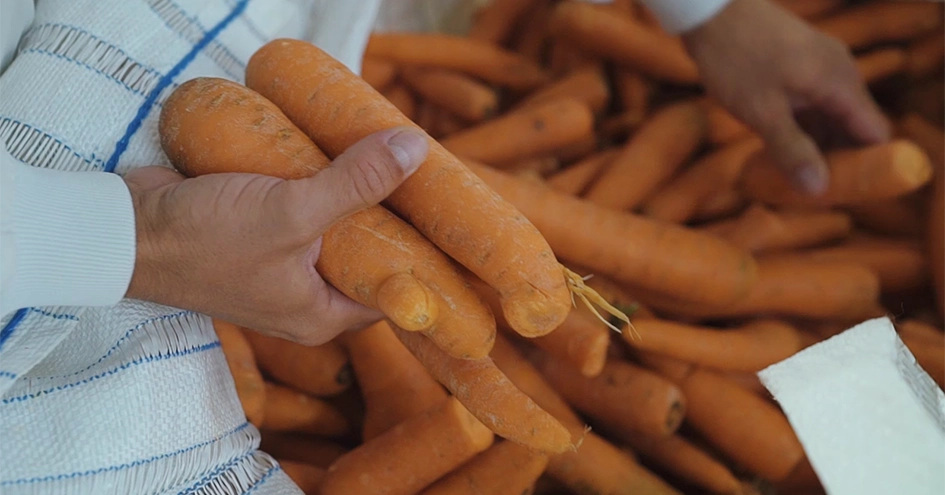
Our commitment to transparency is evidenced in the fact that we were the first retailer in Portugal to calculate and publicly disclose our food waste footprint, in line with the methodology of the World Resources Institute’s Food Loss and Waste Protocol, enabling us to ensure that these objectives are accounted for and monitored.
We continued to fight food waste throughout 2024. Nevertheless, our increasing specialisation in fresh products (products with a low level of processing) presents challenges due to the short shelf life, which limits the effectiveness of these actions. Around 70% of the food waste generated in own operations is in the perishables category.
Food waste1 |
|
2024 |
|
2023 |
|
Δ 2024/2023 |
||||||||
|---|---|---|---|---|---|---|---|---|---|---|---|---|---|---|
Specific Values |
|
|
|
|
|
|
||||||||
Wasted food per food sold and wasted (%) |
|
1.8% |
|
1.7% |
|
+0.1 p.p. |
||||||||
Food wasted per food sold (in kg/t) |
|
19.9 |
|
18.5 |
|
+7.6% |
||||||||
Destination (kg of food wasted/tonne of food sold) |
|
|
|
|
|
|
||||||||
Animal feed and bioprocessing |
|
1.4 |
|
1.0 |
|
+40.0% |
||||||||
Anaerobic digestion, composting and controlled combustion |
|
11.7 |
|
11.2 |
|
+3.6% |
||||||||
Landfill, incineration and wastewater treatment systems |
|
6.8 |
|
6.2 |
|
+9.7% |
||||||||
By business unit (kg of food wasted/tonne of food sold) |
|
|
|
|
|
|
||||||||
Biedronka |
|
21.6 |
|
19.6 |
|
+10.2% |
||||||||
Pingo Doce2 |
|
20.0 |
|
22.1 |
|
-9.5% |
||||||||
Recheio |
|
5.4 |
|
4.0 |
|
+35.0% |
||||||||
Ara |
|
15.3 |
|
14.5 |
|
+5.5% |
||||||||
|
||||||||||||||
In 2024, we recorded 19.9 kg of food waste per tonne of food sold, an increase of 7.6% compared to 2023. Annual food waste in relation to the volume of food sales increased 0.1 p.p. to 1.8%, but is still within our target for 2024-2026 (2.5%).
At Biedronka, the increase is due to the growing supply of perishable products. Pingo Doce launched the “Alimenta o Bairro” (Feed the Neighbourhood) project, aimed at donating more food from Pingo Doce stores to local organisations, previously selected according to strict standards, thus fighting hunger in the local community and food waste in stores. For more information about this initiative, see “Direct support for affected communities”.
The initiatives we have carried out up and downstream of our value chain and in our own operations to fight food waste1 have enabled us to recover 83.3 thousand tonnes of food (70.7 thousand tonnes in 2023), corresponding to around 55 thousand tonnes of carbon dioxide avoided (46.3 thousand tonnes of CO2e in 2023).
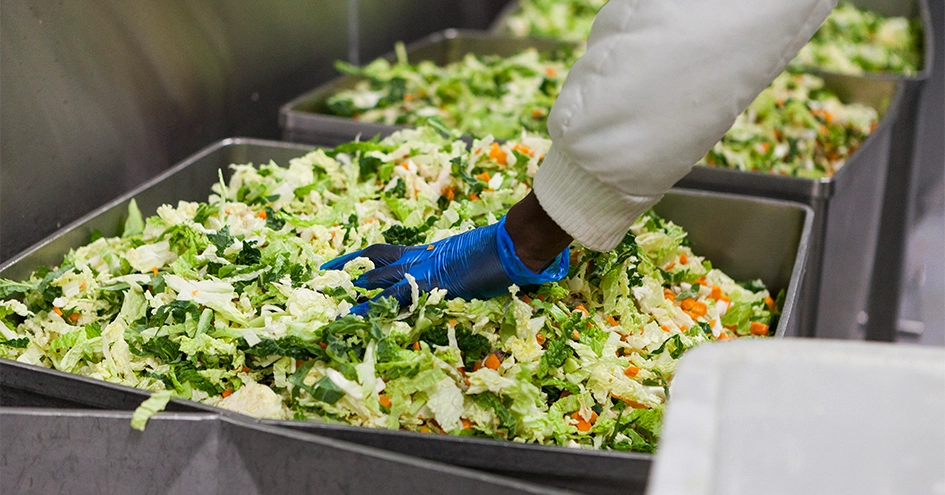
For instance, the incorporation of ungraded food (or “ugly” vegetables with the same nutritional profile as graded products) into the soups we produce in Portugal and Poland, and into 4th range products (washed and pre-cut ready-to-use vegetables) sold at Pingo Doce and Recheio stores. Between 2015 and 2024, these initiatives prevented around 137 thousand tonnes of food from being wasted.
A markdown has been implemented at Pingo Doce since 2019 and at Biedronka since 2020. This initiative involves selling products that are close to their sell-by date at reduced prices and was implemented in 935 stores in 2024. Over 38 thousand tonnes of food waste have been avoided since 2019 through this measure.
Pingo Doce also incorporates leftover roast chicken and roast suckling pig into various products available at the takeaway counter, such as pizzas, salads and sandwiches (avoiding 276 tonnes of food waste in 2024).
Biedronka’s partnership with Too Good To Go since 2023 has been extended to 776 stores, 276 more than in 2023. In 2024, around 1.5 million bags were delivered, preventing an estimated 2,280 tonnes of food from being wasted (42% more than in 2023).

Pingo Doce sells salmon heads at its fish counters at reduced prices, avoiding 181 tonnes of food waste in 2024. Food such as golden apples, Rocha pears, persimmons, green beans and carrot sticks falling outside of specification were also sold. Together, these initiatives helped avoid around 1,600 tonnes of food waste. Pingo Doce also cuts larger fruit (melons, watermelons, cantaloupes, papayas and pineapples) into halves so that customers can buy the quantity they want and avoid waste in stores and at home.
Our Companies also regularly donate food to charities. In 2024, a total of 18,600 tonnes of food was donated through our stores and distribution centres, 3% less than in 2023. For more information about these donations, see subchapter 4. “Social information”, section 4.2. “Managing social topics”, subsection 4.2.2. “Affected communities”, point “Direct support for affected communities”, of this chapter. Employees are trained in order to ensure that food safe for donation is identified, selected and separated.
Along with these measures, our Companies also hold campaigns to raise consumer awareness through their social media pages, leaflets and in-store communication, and publish recipe books to make use of leftover food. More information about these actions is available on our website.
In 2024, Recheio was the first wholesale company in Portugal to receive the “Sustainable Production, Responsible Consumption” seal from the National Commission for Combating Food Waste (CNCDA), joining Pingo Doce. This seal is awarded to public and private organisations that carry out actions to prevent, reduce or monitor food waste.
JMA also helps to fight food waste by incorporating by-products from the food industry and ungraded vegetables into Best Farmer’s cattle feed. Between 2018 and 2024, JMA used 83 thousand tonnes of this type of food.
Waste recovery from operations
As an end-of-line solution, we strive to ensure that as much waste as possible is sent for recovery, in line with the principles of the circular economy. In 2024, our waste recovery rate was 84.8%, with 14.7% of waste going to landfill.
Waste recovery and destination in operations
Waste recovery rate |
|
2024 |
|
2023 |
|
Δ 2024/2023 |
|---|---|---|---|---|---|---|
Overall value |
|
84.8% |
|
85.4% |
|
-0.6 p.p. |
Biedronka |
|
90.0% |
|
91.5% |
|
-1.5 p.p. |
Hebe |
|
78.4% |
|
79.7% |
|
-1.3 p.p. |
Pingo Doce |
|
65.2% |
|
64.3% |
|
+0.9 p.p. |
Recheio |
|
70.3% |
|
72.4% |
|
-2.1 p.p. |
Ara |
|
75.7% |
|
70.7% |
|
+5.0 p.p. |
JMA |
|
92.4% |
|
88.6% |
|
+3.8 p.p. |
Waste management methods |
|
2024 |
|
2023 |
|
Δ 2024/2023 |
||||
|---|---|---|---|---|---|---|---|---|---|---|
Recovery1 |
|
84.8% |
|
85.4% |
|
-0.6 p.p. |
||||
Landfill |
|
14.7% |
|
13.5% |
|
+1.2 p.p. |
||||
Incineration (without energy recovery) |
|
0.0% |
|
0.1% |
|
-0.1 p.p. |
||||
Other destinations without recovery |
|
0.4% |
|
1.0% |
|
-0.6 p.p. |
||||
|
||||||||||
Customer waste recovery
In addition to separating waste for recovery in our own operations, we provide solutions (such as recycling bins and other waste collection systems) to make life easier for our customers, including for2:
- the collection of small electrical appliances, used cooking oil and light bulbs at 98% of the Pingo Doce store network;
- the collection of used batteries at all Pingo Doce and Recheio stores;
- the collection of small electrical appliances and used batteries at 93% of Biedronka stores;
- the collection of used batteries at 71% of Ara stores;
- the collection and recycling of coffee pods at Pingo Doce stores (which helped raise 2,230 euros for charity).
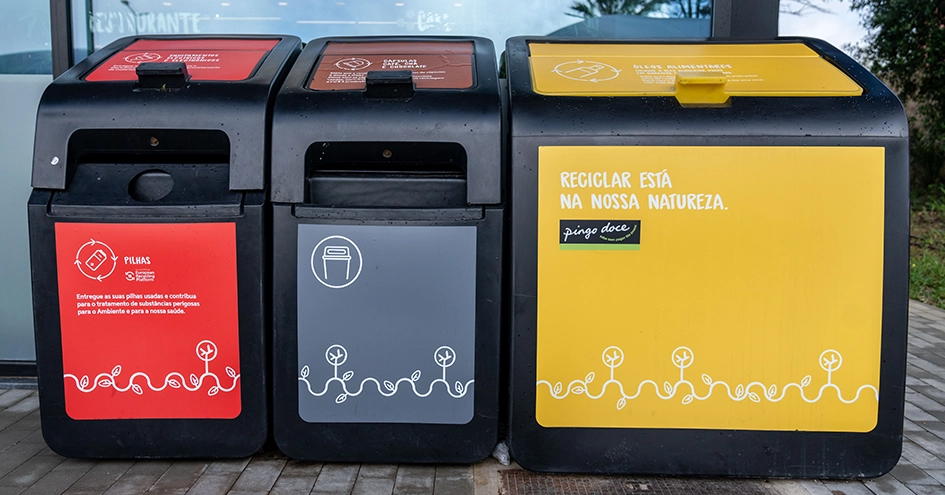
Recheio, in partnership with Novo Verde (a waste management company), encourages the separation of plastic and metal packaging waste by its HoReCa customers. Between May 2023 and December 2024, the store in which the project was implemented recorded 21,000 uses of the recycling bins by customers and the collection of more than 108 tonnes of waste;
Pingo Doce partnered with a project that encourages consumers to return beverage containers. Around 136 tonnes of materials, such as PET, glass and aluminium, have been collected since the start of this initiative in 2019.
Waste collected in stores (tonnes) |
|
2024 |
|
2023 |
|
Δ 2024/2023 |
||||
|---|---|---|---|---|---|---|---|---|---|---|
Pingo Doce |
|
626.08 |
|
648.44 |
|
-3.4% |
||||
Batteries |
|
19.05 |
|
18.74 |
|
+1.7% |
||||
WEEE1 |
|
46.21 |
|
69.33 |
|
-33.3% |
||||
Used cooking oil |
|
64.63 |
|
72.59 |
|
-11.0% |
||||
Coffee pods |
|
496.19 |
|
487.8 |
|
+17.2% |
||||
Recheio |
|
2.15 |
|
0.20 |
|
+973.8% |
||||
Batteries |
|
0.76 |
|
0.20 |
|
+371.3% |
||||
Coffee pods |
|
1.39 |
|
0.00 |
|
– |
||||
Biedronka |
|
349.24 |
|
300.33 |
|
+16.3% |
||||
Batteries |
|
318.70 |
|
273.67 |
|
+16.5% |
||||
WEEE1 |
|
30.54 |
|
26.65 |
|
+14.6% |
||||
Hebe |
|
0.05 |
|
1.20 |
|
-95.8% |
||||
Batteries |
|
0.05 |
|
1.20 |
|
-95.8% |
||||
Ara |
|
28.52 |
|
16.33 |
|
+74.6% |
||||
Batteries |
|
0.16 |
|
0.16 |
|
0.0% |
||||
Used cooking oil |
|
0.07 |
|
0.02 |
|
+250.0% |
||||
WEEE1 |
|
28.28 |
|
16.15 |
|
+75.1% |
||||
|
||||||||||
Our network of recycling bins remained available to customers at our stores in 2024, helping to introduce secondary raw materials into the value chain and promoting a more circular economy. The collection of customer waste at Biedronka increased as a result of awareness-raising campaigns and investments made. The increase in the collection of Waste Electrical and Electronic Equipment (WEEE) at Ara is due to a new partnership established in 2024 with an operator that has a greater capacity to manage and properly dispose of this waste.
1 More information is available on our website.
2 For more detailed information on the number and type of recycling bins available to customers, visit the “Responsibility” page at www.jeronimomartins.com.
